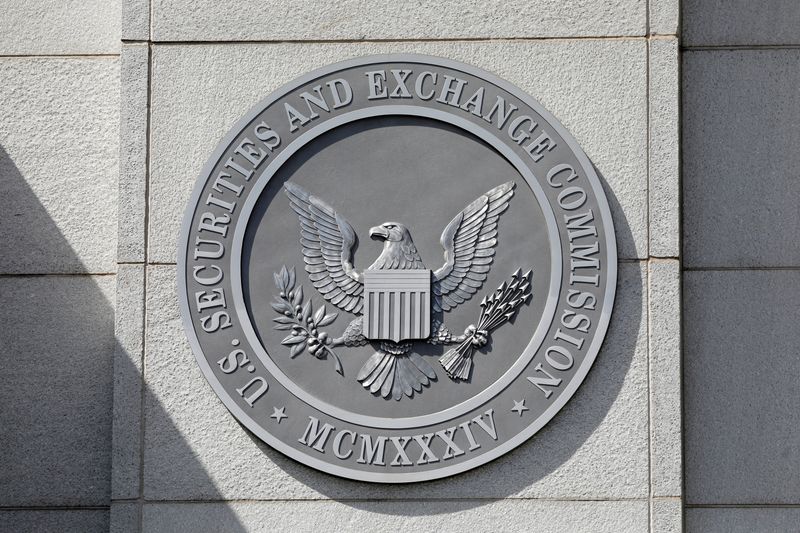By Michelle Price and Pete Schroeder
WASHINGTON (Reuters) -The U.S. Securities and Exchange Commission (SEC) on Wednesday proposed draft rules to boost the use of central clearing in the $24 trillion Treasury market in a bid to boost its resilience.
The proposals, which would apply to cash Treasury and repurchase agreements traded by a range of firms including broker dealers and hedge funds, follow liquidity crunches in recent years which have raised regulatory concerns about the Treasury market's ability to function during times of stress.
Most notably, Treasury market liquidity all but evaporated in March 2020 as COVID-19 pandemic fears gripped investors, prompting the Federal Reserve to prop up the market. Traders say they continue to see liquidity problems with some securities, Reuters reported last month.
The SEC and other U.S. regulators have been exploring reforms to boost the market's resilience. If finalized, the SEC's reforms would mark the most significant changes to the Treasury market, the world's largest bond market which is used to benchmark assets globally, in decades.
The proposal stops short, however, of imposing a general clearing mandate. Instead, it imposes new rules on clearing houses that would require their members - typically big banks and trading firms - to push their clients' trades, such as those of other dealers, hedge funds and principal trading firms through the clearing house.[L4N30K3DW]
Principal trading firms and hedge funds have accounted for an increasing proportion of trading in the Treasury market over the past decade, but do not typically clear their trades.
Central clearers sit in the middle of the market as the buyer to every seller and the seller to every buyer. Central clearers net positions across the market and then require counterparties to put up margin, such as cash or stocks, to guarantee the trade's execution in the event either defaults.
The proposal would also change the rules around how clearing house members treat their clients' margin, requiring them to pass on margin they gather from clients to the clearing house.
SEC Chair Gary Gensler has advocated expanding central clearing on the basis it increases resilience by bringing additional capital into the market during times of stress.
"These rules would reduce risk across a vital part of our capital markets, both in normal and stress times," Gensler said in a statement during an SEC open meeting to vote on the rule on Wednesday.
Overall, just 13% of Treasury cash transactions are centrally cleared, while 68% are cleared bilaterally, firm-to-firm, according to estimates in a 2021 Treasury Department report.
In a statement, Bryan Corbett, CEO of the Managed Funds Association which represents hedge funds, said the group supported measures to boost market integrity, but was concerned about "arbitrarily singling out hedge funds" for clearing "which could impact market competition and lead to increased costs borne by institutional investors."
While the changes would apply to any clearing house that clears Treasuries, they effectively target the Depository Trust and Clearing Corporation (DTCC) whose Fixed Income Clearing Corp. subsidiary is currently the chief clearer of Treasuries.
"While the risk mitigation and transparency benefits of central clearing are well documented, we recognize the impact the proposal will have on a market structure where bilateral activity has been the ongoing practice for various market participants," a DTCC spokesman said in a statement.

All five of the SEC's commissioners voted to propose the rule change, which is now subject to industry feedback.
The SEC is also working on rules to boost the resilience of platforms where Treasuries are traded and to ensure proprietary trading firms are registered as dealers and subject to capital requirements and other checks. But the clearing rules changes are the "core resiliency piece" Gensler told reporters on Wednesday.